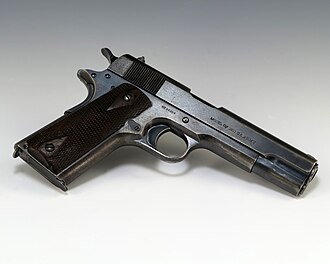Pistol


Pistol is a term used to describe a small, handheld firearm designed for individual use. Pistols are distinguished from other types of firearms, such as rifles and shotguns, by their size, ease of handling, and the fact that they can be operated with one hand. This category of firearm has a rich history, evolving from early single-shot designs to the modern semi-automatic and fully automatic models available today.
History[edit]
The history of the pistol begins in the 15th century, with the invention of the hand cannon, a small, hand-held version of the cannon. This evolved into the wheellock pistol in the 16th century, which was followed by the flintlock pistol in the 17th century. The development of the revolver in the 19th century by Samuel Colt revolutionized the pistol, allowing for multiple shots to be fired without reloading. The late 19th and early 20th centuries saw the advent of the semi-automatic pistol, which uses the energy of one shot to reload the chamber for the next, allowing for rapid fire.
Types[edit]
Pistols can be broadly categorized into several types based on their mechanism of operation and use:
- Single-shot pistols: Early pistols that could fire only one shot before needing to be reloaded.
- Revolvers: Feature a revolving cylinder containing multiple chambers, each holding a single cartridge.
- Semi-automatic pistols: Automatically reload after each shot, but require the trigger to be pulled for each shot.
- Automatic pistols: Capable of firing multiple shots with a single pull of the trigger.
Components[edit]
A typical pistol comprises several key components:
- Barrel: The tube through which the bullet is fired.
- Frame: The main body of the pistol, to which other components are attached.
- Action: The mechanism that facilitates the firing of the pistol, including the trigger system.
- Magazine: A device that holds and feeds ammunition into the pistol's chamber.
- Sights: Used to aim the pistol.
Safety and Regulation[edit]
The use of pistols is subject to various laws and regulations, which can vary significantly by country. These regulations often include requirements for ownership, carrying, and storage. Safety mechanisms are also an important aspect of pistol design, including manual safeties, grip safeties, and trigger safeties, to prevent accidental discharge.
Sport and Recreation[edit]
Pistols are used in various sports and recreational activities, including target shooting, biathlon (which combines cross-country skiing and shooting), and practical shooting competitions. These activities test precision, speed, and accuracy in shooting.
Military and Law Enforcement Use[edit]
Pistols are a standard sidearm for military and law enforcement personnel around the world. They are chosen for their portability, ease of use, and effectiveness at close range.
Conclusion[edit]
Pistols play a significant role in many aspects of society, from sports and recreation to law enforcement and personal defense. Their development over centuries has led to a wide variety of designs and technologies, making them a key subject of interest for enthusiasts and professionals alike.
Ad. Transform your life with W8MD's Budget GLP-1 injections from $75


W8MD offers a medical weight loss program to lose weight in Philadelphia. Our physician-supervised medical weight loss provides:
- Weight loss injections in NYC (generic and brand names):
- Zepbound / Mounjaro, Wegovy / Ozempic, Saxenda
- Most insurances accepted or discounted self-pay rates. We will obtain insurance prior authorizations if needed.
- Generic GLP1 weight loss injections from $75 for the starting dose.
- Also offer prescription weight loss medications including Phentermine, Qsymia, Diethylpropion, Contrave etc.
NYC weight loss doctor appointmentsNYC weight loss doctor appointments
Start your NYC weight loss journey today at our NYC medical weight loss and Philadelphia medical weight loss clinics.
- Call 718-946-5500 to lose weight in NYC or for medical weight loss in Philadelphia 215-676-2334.
- Tags:NYC medical weight loss, Philadelphia lose weight Zepbound NYC, Budget GLP1 weight loss injections, Wegovy Philadelphia, Wegovy NYC, Philadelphia medical weight loss, Brookly weight loss and Wegovy NYC
|
WikiMD's Wellness Encyclopedia |
| Let Food Be Thy Medicine Medicine Thy Food - Hippocrates |
Medical Disclaimer: WikiMD is not a substitute for professional medical advice. The information on WikiMD is provided as an information resource only, may be incorrect, outdated or misleading, and is not to be used or relied on for any diagnostic or treatment purposes. Please consult your health care provider before making any healthcare decisions or for guidance about a specific medical condition. WikiMD expressly disclaims responsibility, and shall have no liability, for any damages, loss, injury, or liability whatsoever suffered as a result of your reliance on the information contained in this site. By visiting this site you agree to the foregoing terms and conditions, which may from time to time be changed or supplemented by WikiMD. If you do not agree to the foregoing terms and conditions, you should not enter or use this site. See full disclaimer.
Credits:Most images are courtesy of Wikimedia commons, and templates, categories Wikipedia, licensed under CC BY SA or similar.
Translate this page: - East Asian
中文,
日本,
한국어,
South Asian
हिन्दी,
தமிழ்,
తెలుగు,
Urdu,
ಕನ್ನಡ,
Southeast Asian
Indonesian,
Vietnamese,
Thai,
မြန်မာဘာသာ,
বাংলা
European
español,
Deutsch,
français,
Greek,
português do Brasil,
polski,
română,
русский,
Nederlands,
norsk,
svenska,
suomi,
Italian
Middle Eastern & African
عربى,
Turkish,
Persian,
Hebrew,
Afrikaans,
isiZulu,
Kiswahili,
Other
Bulgarian,
Hungarian,
Czech,
Swedish,
മലയാളം,
मराठी,
ਪੰਜਾਬੀ,
ગુજરાતી,
Portuguese,
Ukrainian